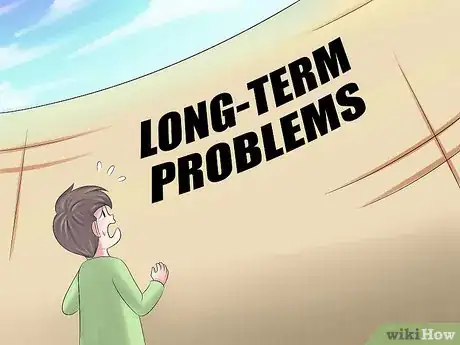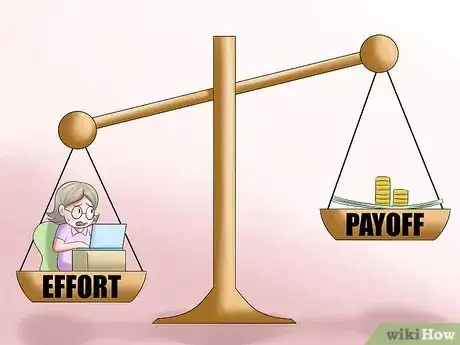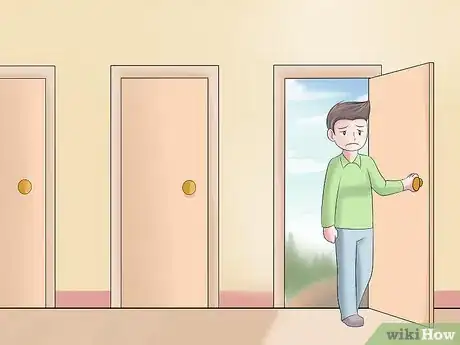X
wikiHow is a “wiki,” similar to Wikipedia, which means that many of our articles are co-written by multiple authors. To create this article, 29 people, some anonymous, worked to edit and improve it over time.
This article has been viewed 119,567 times.
Learn more...
Quitting, or giving up is seen as anathema in many cultures, as it is viewed as a sign of weakness, lack of tenacity, and throwing in the towel when trying again and again would be the more heroic avenue. The myths built up around never giving up, however, are unfairly holding many of us to paths in life that go nowhere quickly and can turn our lives into humdrum routine. Not only is it possible to give up gracefully, but sometimes it is essential.
Steps
-
1Consider the situation confronting you. What is it about the situation that makes you feel like quitting? Is it a long-term problem or simply one that has arisen recently? The duration of a challenge in your life is an important determinant on the worthiness of sticking with something. The rationale that you have done something for a long time, and that investment of time requires you to stick with it until you've seen it through can be an albatross around your neck. It can tie you to something that will ultimately not be fulfilling, and might even turn out badly.[1]
- Don't stick with something just because you have been doing it a long time - just because you've been doing it for years is no reason to continue doing it. Your reason for continuing must be stronger than that. Not only that, but giving up before you have really started on something is not always wrong - even if you're at altitude in the plane, you can still decide not to make that parachute jump. There are times when listening to our instincts just makes sense for our own personality type.
-
2Consider your effort vs, the payoff in your current situation. Sometimes, your vision of the career path you choose differs from the reality. Perhaps you wanted to become a Disney animator, but after working in the field awhile, you see that the work is repetitive and it feels tedious to you. Or perhaps you started a graphic design business, but after a few years, you realize that the amount of labor often far exceeds the price you can reasonably charge for each job. Coming to the realization that the payoff does not compensate you for the effort you need to invest is the key. Realizing this is not quitting in the negative sense. It is an honest, unsparing appraisal of your situation.[2]
- Even Donald Trump advises entrepreneurs "not to fall so in love with their own ideas that they don't know when to cut their losses - quit and move on." He advises getting out before those ideas drag you down and you lose everything. In other words, if you're working for peanuts, exhausting yourself for little return, and decide to end this venture so that you can try something that will be more personally or financially rewarding, that's simply cutting out an unprofitable venture and freeing yourself to pursue a better path. It should not be seen as just quitting because something is hard. It's the same with personal ventures - if your relationship is all you, giving all the time, always bending away from what you want, and never coming back your direction (give and take), give up. Break it off and meet someone new who will be more compatible with your wants.
Advertisement -
3Realize that giving up on something in our lives can be a way of shutting one door and opening numerous others. Even if it's a cut-and dried defeat, it may not be all bad. When something in life defeats us (whether it be a relationship, studies, a project, work, friendships, etc.), it isn't the end of the world. It might hurt a lot, frustrate you, and cause you to rethink everything you've ever believed in, but it is really important to view this as one phase in your life - a time that you have experienced and have learned from.
- The next stage of your life will be different, as it will be informed by what has happened and what you had to quit in order to move forward. Take this positive view of the ending being a learning process and you will forge ahead well into your new endeavors.
-
4Don't listen to people who have no other advice than to "keep with it." If they cannot come up with any real and convincing reasons for you to stick with something that is simply not working out in your life, other than that "giving up is for wimps", you are not getting good advice. Socially, we are all fed the ideal that giving up is a last resort and not a good one in any case. Realistically, giving up is an essential part of moving on and getting things right the next time around.
-
5Be open about your change of plans and use positive language about your decision to quit. The manner in which you frame your choice to give up whatever it is that is ailing you and holding you back matters. If you go around with sagging shoulders, hunched back, quivering lip, and an attitude as fragile as glass, you risk others amplifying the "wrong" decision you have made to give up. On the other hand, if you keep a spring in your step despite your reservation, and you have clear, well-thought out responses to people's qualms about your choice, you will fare much better.[3]
- People respond positively to a positive take on hard luck stories because they inevitably place themselves in your shoes and try to envision how they would react if it happened to them; moreover, many people are actively storing away your decision to inform their own life's path! So give them something positive and constructive to take away from your experience with your upbeat explanations about why your decision was the right one. They may even have some positive reinforcement or great idea to add, once you have them on board with your decision to quit.
-
6Expect doubt to visit now and then. It's only natural. Equally, however, be ready to counteract doubt immediately with all of the reasons for why giving up was such an essential and important part of your life's growth at this point in time.
-
7Know that you are not someone who gives up generally. In other words, this has all been about knowing how to pick your battles, rather than a personality trait. Realizing that this is not "the hill you want to die on" means you have become discerning enough to know when it is worth hanging in there for something you truly believe has a real chance to work out well. Realistic analysis of your situation is always key to making a sensible decision about giving up. Ultimately, keep in mind that giving up in any instance is about the particular situation in your life, not a way of being for your entire life.[4]
- Sometimes when you face tribulations, in your weakness you think of quitting. We always disparage those who surrender or resign easily just because they are foiled by problems. But sometimes when you give up, you will feel relaxed and less anxious. Because you might have a larger goal that you feel more connected to than what you have been chasing till now. Giving up does not mean an end alone. It means an end leading to a new beginning.
Advertisement
Warnings
- If you find yourself repeatedly quitting and starting over, you will gain the reputation of being a flake, and it may be true. Knowing when to quit and doing it in a well-considered, judicious manner is key to moving forward in life. Just quitting when things get tough really is the mark of a cowardly approach to life, and will only move you in circles, never progressing. Toughen up!⧼thumbs_response⧽
- Don't just quit because you're "bored." Find ways to get energized and excited, and look for opportunities to make your work or endeavor feel vital and alive to you. We all get bored from time to time - that's your cue to get moving and make something exciting happen, not necessarily an indication that you should quit.⧼thumbs_response⧽
Advertisement
References
- ↑ https://hbr.org/2021/09/do-you-know-when-to-give-up
- ↑ https://www.psychologytoday.com/intl/blog/supersurvivors/201709/why-giving-can-sometimes-be-good
- ↑ https://www.psychologytoday.com/intl/blog/supersurvivors/201709/why-giving-can-sometimes-be-good
- ↑ https://hbr.org/2021/09/do-you-know-when-to-give-up
About This Article
Advertisement

































































